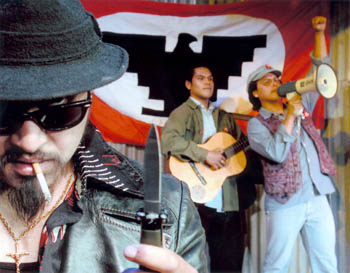![[MetroActive Stage]](/stage/gifs/stage468.gif)
[ Stage Index | Santa Cruz Week | MetroActive Central | Archives ]
Brothers in Arms
With a revival of one of his early works, Luis Valdez creates a masterpiece for a new generation
By C. Kevin Smith
THE FRENCH WRITER Stendhal famously said that injecting politics into art was like firing off a shotgun during a concert. Too often, works of art whose sole aim is to communicate an ideological message end up sacrificing subtlety and artistry for propagandistic thrust. Yet, once in a while a work of art comes along that illuminates with compassion and clarity just how profoundly our lives are shaped by the political world we inhabit, and by the choices we make about that world.
One such work is the gripping play Mundo Mata (World Kills), which is being performed this month at El Teatro Campesino in San Juan Bautista. Written and directed by Luis Valdez, who founded the theater during the Delano grape strike in 1965, Mundo Mata stages the unionization conflicts of the early 1970s within the story of two brothers forced to confront the consequences of their very different actions on a community they both cherish.
Indeed, conflicts abound in Burlap, California, the fictional setting of the play, no more so than within the mind of the play's titular character, Raymundo Mata (played by Kinan Valdez). Mundo's brother, Salvador "Bullet" Mata (Lakin Valdez), left Burlap to go to college and discovered big-city activism; Mundo's only foray outside of Burlap was his traumatic tour of duty in the Vietnam War. Now he spends his time conducting shady deals with farm bosses and the local sheriff (whose wife he is bedding) and getting drugs for strung-out friends.
The fragile status quo of Mundo's life is threatened by the return of his brother, who is now working for Cesar Chavez and his campaign to unionize Chicano farmworkers. Mundo is hired by the powers-that-be to undermine his brother's work; there are even dark hints of assassinating Chavez (who died in his sleep in 1993).
The play's strength lies in its powerful depiction of two brothers caught in a relationship that veers from affection to mistrust and fear. In an electrifying performance, Kinan Valdez portrays Mundo as a survivor whose raw emotions are never far from the kind of violence he has already encountered firsthand.
Salvador, as the story's narrator, represents the ethical heart of Mundo Mata, and Lakin Valdez invests his character with appealing earnestness. Perhaps reflecting the convictions of the play's creators, Salvador never questions the rightness of his actions, whatever the cost, and in this steadfastness of purpose he is less compelling dramatically than Mundo, whose every choice seems fraught with a brittle bravado.
The ensemble scenes bustle with energy and are graced by several strong performances. Especially noteworthy are the pair Botella (Katrina Valdez) and Tapon (Daniel Valdez), whose concern for each other, as well as for the extended family of campesinos, exemplifies the play's community-minded spirit. Estrella Esparza, in a dual role, gets the play's biggest laughs when her suspicious Doña Lola (the brothers' mother) says in reference to Cesar Chavez that he is a living saint, "and the only ones you can trust are the dead ones."
Mundo Mata unfolds as a series of dramatic tableaux that have a certain cinematic quality, perhaps reflecting the playwright's successes in Hollywood (Zoot Suit, La Bamba). The deceptively simple set of wooden packing crates is put to brilliant use. More than just props, these vegetable crates are woven into every aspect of the characters' day-to-day existence. Throughout the play the actors are well-served by strong production values: a sensitive use of lighting that employs shadow and silhouette to add dimension to the story; superb period costumes; and a musical soundtrack that reinvigorates politically charged songs we tend to hear today only in commercials.
All these elements come together in a shattering solo scene that places America's Vietnam experience at the heart--the poisonous, corrosive heart--of Mundo Mata's scarred soul; his scars, we understand, are also those of a nation.
Originally written and performed in 1976, Mundo Mata has been reshaped and retooled for a new generation of activists. Like El Teatro Campesino itself, this play is an ever-growing family affair: a family that spreads its arms wide to embrace a diverse community. Indeed in this production the audience also feels to be part of the play and its unfolding drama, giving once again fresh meaning to the idea that the political is always personal.
Copyright © Metro Publishing Inc. Maintained by Boulevards New Media.
![]()

Strike Team: The characters played by Luis Valdez's sons, Kinan, Lakin and Anahuac, personify the UFW conflicts of the early '70s in 'Mundo Mata.'
Mundo Mata plays at 8pm, Thursday through Saturday; and at 5pm, Sunday; through July 1, at El Teatro Campesino, 705 Fourth St., San Juan Bautista. Tickets are $8-$12; all Thursday shows are $5. Call 831.623.2444 for tickets or visit www.elteatrocampesino.com.
From the June 13-20, 2001 issue of Metro Santa Cruz.